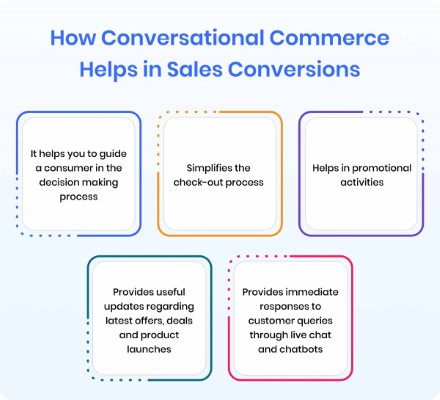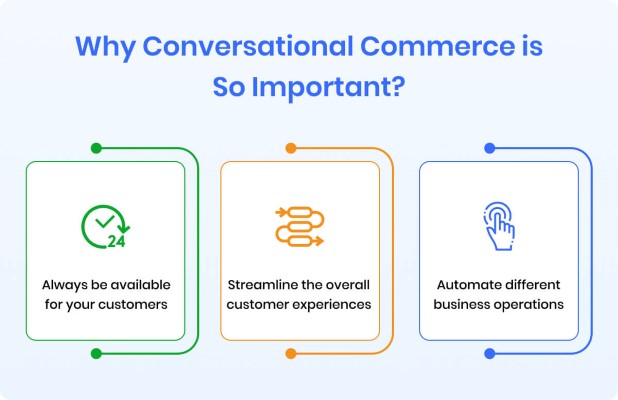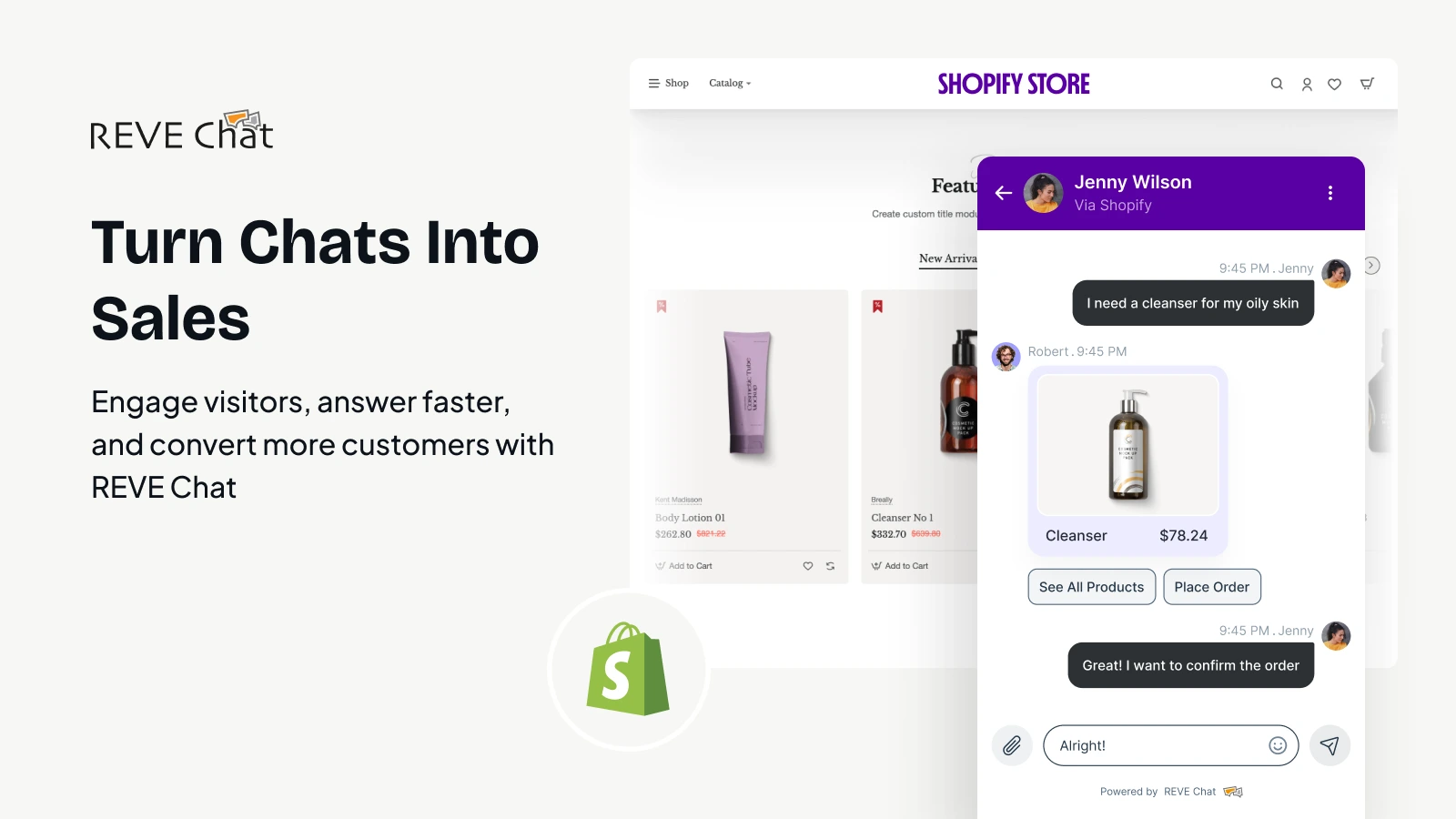Conversational Commerce: Why is It Important for the Brands?
- December 14, 2022
- 21 mins read
- Listen

Suppose you have just walked into a beautiful store to check out some interesting stuff and guess what! There’s no one to welcome you. Moreover, you are confused and want some help from the salesperson. But whom to ask? The store has no one to help you. What will you do?
You will leave disheartened and chances are you will never come back to visit that store. The same thing happens in so many online stores without conversational commerce.
Nowadays we have become much more comfortable shopping online than going to a physical store to buy something. So many avenues have opened up for us to make online purchases and interact with the support team. The whole process has made the competition tougher.
So, being an online business owner, if you want to stay ahead of your competitors, you have to get connected with the consumers anywhere and everywhere, via social media, live chat, etc. you name it.
Here conversational commerce comes into the picture. It can help your company to talk with customers via different chat and messaging applications like WhatsApp, Facebook Messenger, and other voice assistants like Alexa, etc. Let your customers get instant assistance, and make an online purchase from the same messaging apps.
So it’s high time companies should embrace conversational commerce to offer better customer experience and increased sales conversions. In this blog, I am going to explain what conversational commerce actually is, its various benefits, best practices, and some of the most used software that can benefit your business.
What is Conversational Commerce?
‘Conversational Commerce’ trend is the newest era in the world of eCommerce, where customers can talk to your company via different messaging applications or AI platforms to explore your products and offerings, place new orders, make payments, and so on.
If you start implementing conversational commerce for your online business, you will see how it can make so many things easier for you. It helps customers to get valuable information about different products they wish to buy.
On the other hand, being a business owner will also help you to offer instant and personalized assistance to the customer in choosing the right product for him, thus making him feel more satisfied and comfortable with your brand.
The way conversational commerce has been evolving will gradually improve the relationship between a brand and the consumer. As each section of the interaction can be personalized, companies will now get more chances to increase their conversions.
Selling more is not only beneficial for your company but you will also get the chance to satisfy your customers and make them loyal ones towards your brand.
Yes, unlike a physical store, it’s tough to provide the same kind of personal touch in an eCommerce business. So, you can compensate here with the help of conversational commerce. It actually does not matter how you are going to offer the conversational experience to your potential buyer.
Be it a live chat solution, AI chatbot, voice assistant, or any other messaging platform, It will serve your purpose if the customer communication is effective, personalized and at last you can close the deal.
What is Conversational Commerce in eCommerce?
Conversational commerce in eCommerce transforms online shopping into a more interactive and personalized experience by using the power of AI and machine learning. Through friendly chatbots, messaging apps, and voice assistants integrated into websites, customers now can engage in in real-time conversations with customer reps.
Gone are the days of navigating through menus and clicking through web pages to find the required info. Instead, customers can simply chat, ask questions, seek recommendations, make purchases, and receive support—all within the conversational interface.
The goal? To make online shopping feel more like a conversation with a knowledgeable friend. This innovative approach not only enhances convenience but also adds a personal touch to the buying process. With advanced technologies like artificial intelligence and natural language processing, these virtual assistants can understand and respond to customer queries in real time, making the shopping journey smoother and more enjoyable.
Types of Conversational Commerce
I have already described what conversational commerce is all about and where you can connect with the target audience. Conversational commerce has some overwhelming advantages, where customer retention and increased sales conversions are the major ones. Now let’s discuss what are the best commerce platforms available there and which one should be the right choice for your business.
-
Live Chat Solution
As per Econsultancy, “offering live chat assistance on the eCommerce website helps businesses to generate 73% customer satisfaction level compared to 44% for phone support and 61% for email support respectively.”
Most companies nowadays have deployed live chat assistance on their websites and it has become a compulsion now. Live chat helps customers to get quick and real-time assistance from the support team, eliminating the hassles of making a phone call and waiting to get connected to the customer care executive or writing a long email describing all your issues and waiting to get a reply.
Live chat solution helps your support team member to monitor website visitors in real-time and reach proactively to offer personalized assistance rather than waiting for the customers to poke them for help. You can handle multiple chat sessions at a time instead of being engaged with only one customer over a phone call.
All these benefits together help you to offer excellent customer service leading to a higher customer satisfaction rate and increased sales conversions. In the market, you will get multiple live chat options to choose from but choose the one which suits your business the best.
-
Chatbot
As per a recent study, a big percentage (87.2%) of customers are having neutral or positive experiences with AI chatbots. Can you imagine an AI robot being a customer support agent answering all your queries? Yes, it’s possible and this will be the future.
If we think of getting personalized assistance from the customer support team, we always imagine it to be a real human agent, not a robot. But it’s true that now friendly chatbots automate the whole customer support operations and helps customers to resolve their issues.
With the help of Artificial Intelligence (AI), chatbots are now capable of understanding human languages, interpreting questions from voice and textual inputs, and providing appropriate responses.
With conversational AI, chatbots can easily provide answers for payments, order placements, refunds and replacements, FAQs, and many more. You can also take help from chatbots to get instant customer feedback or promote cross-sell and up-sell.
One more thing, chatbots can be integrated with not only your website but also on different messaging platforms like Facebook, WhatsApp, etc, to offer effective customer experiences.
-
Voice Assistants
Now, what is a voice assistant? It is basically software that gets activated by different voice commands. Users can ask questions and these voice assistants can give you prompt responses or even open specific web pages based on your voice commands.
Google Assistant, Alexa from Amazon, or Siri by Apple are some of the best examples that are getting popular nowadays. This has encouraged many companies to add them to their eCommerce platform and customer support strategies to increase brand awareness and customer satisfaction.
Voice Assistants talk in a funny way maintaining a great sense of customer engagement and humor while providing information related to user searches. Being a unique way of providing assistance always lightens up the mood and helps to create an emotional bond between your brand and the customers.
-
Customized Pushed Notifications
Now you can also let your customer have an option to set chatbot reminders. This unique feature helps them to interact with a chatbot for monitoring the pricing or stock levels of a specific product or service. Customers will get instant real-time notifications in case of a pricing change.
You can also use Facebook and its specific features to send users notifications related to your product offerings. Such a proactive approach always helps in sales conversions and sometimes tends to close a deal that may not possible otherwise.
Most importantly you can automate the whole process with very little investment.
-
Social Messaging Platforms
Most of us use different social messaging apps like Facebook Messenger, WhatsApp, or Instagram much more than social media platforms. Before buying any product, we do some market research, everyone does this. We go through various reviews on social media channels, and use social messaging apps as search engines to get information.
So, you must deploy someone there who can answer all the customer queries. Conversational commerce can help you here too.
Benefits of Conversational Commerce
Conversational commerce helps you to recreate the same experience that customers generally get in normal brick-and-mortar stores. The main difference here is that they don’t need to leave their houses most appropriately in their comfort zones to get that happen.
Conversational commerce helps you to provide an effective and personalized customer experience that improves customer satisfaction and sales conversions. So, let me list down here all the main advantages that you need to understand.
-
Increased Sales Conversions
As each and every customer interaction is being personalized, it can be optimized for sales conversions. When customers are reaching out to you personally, it means that they are interested in buying your products or services and chances are that you can close the deals.
Here you have to give the final push for a successful conversion. So, conversational commerce is definitely a great field worth investing in. As per a recent study by Forrester, “nearly 68% of customers opt for brands that offer effective communications like live chat.
Personalized assistance always improves sales conversions. Live chat or chatbots help brands to offer instant assistance to customers and build a positive relationship with them. Just like physical stores, here too customers tend to come back if they find out that you are always eager to help.
-
Effective Customer Experience
Convenience and personalization, the two main aspects of conversational commerce together can provide a great customer experience.
As per Forrester, nowadays, the young generation doesn’t like to wait too long for getting assistance. Because of the prompt response of live chat and chatbot solutions, these two have become their favorites.
-
24/7 Customer Support
When you have an online store, you must have customers all around the world. They have different geographic locations and time zones. Providing 24/7 customer support has to be there but many companies cannot provide it because of higher operational costs.
Also, customers prefer instant replies to their queries which is not possible through phone or email support. So, here chatbots come as your savior. Chatbots can provide 24/7 customer support automating your whole customer service operations. That too within a limited budget.
-
Helps to Collect Valuable Customer Feedback
A live chat solution is one of the most effective tools to collect instant customer feedback for your brand. It’s much more detailed and less expensive than various market research surveys. Most importantly it’s less expensive. However, another alternative can be chatbots.
During the end of every chat session, the support agent can request the customer to share his valuable feedback or rate your service.
Some More Benefits Include:
- Brands can expand with lower investments
- Reduces cart abandonment rate
- More up-selling and cross-selling opportunities
- Helps to get more loyal customers
How to Get Started with Conversational Commerce
Developing a conversational commerce strategy for your business definitely is a time-consuming job and requires a lot of thought and research work. You just cannot start on all the platforms together, rather take baby steps to move forward.
Here. Let’s look into the steps to get started!
-
Understand What Your Business Needs to Flourish
First, understand the improvement areas and the customer pain points. It helps to build realistic strategies keeping those customer issues in mind. For example, suppose you have multiple products or services on your website to choose from and customers are getting confused in selecting the right ones for them.
All you need to do is categorize those products as per customer preferences and things will be easier for them. Also, set timelines, prioritize the objectives, and measure the impacts for every stage of conversational commerce strategy.
-
Do the Market Research
Setting up conversational commerce for a company is expensive, so you have to look into the pros and cons of all the major solutions available in the market. Sign up for free trials and take as many demos as required before selecting the best platform for your company.
Also, a comparative study on how other companies are coping with conversational commerce will help you understand what customers actually want and how to cater to their requirements. Then you can choose the appropriate tool to go ahead with implementing conversational commerce.
You can also initiate short interview sessions with the customers to understand their requirements and expectations from your business.
-
Identify a Conversational Solution that Will Suit Your Business
Before adopting conversational commerce, you need a specialized team of experts for designing and management of all kinds of integrations. Here, you need to understand the limitations and other technicalities of your company first before selecting the right platform for your team.
For example, you may not have a bigger team for providing live chat assistance, in that case, you can easily opt for AI chatbots to provide instant responses to customer queries and automate customer service operations.
-
Launching of the Platform
Once you have successfully implemented the conversational commerce solution, its’ now time to go through the other performance metrics and key performance indicators (KPIs). It may include different customer satisfaction scores, internal process quality, conversion rates, and so on.
KPIs are vital to calculating the overall ROI of your commerce tool and measuring its effectiveness. Once you have successfully set the KPIs and complete all kind of testing, you are good to go with your conversational commerce platform.
-
Measuring Performance
Yes, you have successfully added a conversational commerce platform for your brand but you are not done yet. How will you improve if you don’t monitor and track real-time data to understand how effective it is? No matter how good your platform is, there is always a chance for further improvements.
So, measure the effectiveness on a regular basis to make useful business decisions related to your customer support, marketing, and other promotional activities.
Best Practices for Conversational Commerce
Conversational commerce can be used differently depending on customer preferences. The objective here should be to help customers, not to annoy them.
Your support team should be helpful and kind enough while handling customers. The best practices mentioned below will help you to get an idea of what I am trying to explain.
Knowledge and Awareness
This kind of awareness-based interaction generally tends to occur on social media messaging apps. This is actually much before the consumers actually land on your website. Your team should provide quick and relevant responses here.
Dos:
- Set up chatbots for FAQs to provide instant replies to customer queries
- Give a clear message that you provide 24/7 customer support to your customers
- Add welcome messages to greet people and engage with them
Don’ts:
- Don’t spam your customers
- Don’t make them wait too long for getting replies from your team
Consideration
Many times, customers come to your website, like something but later get confused. Chances are that they will eventually leave without making any purchases. So here the best idea would be to add live chat assistance on your website. It lets your team monitor the website visitor’s website journey in real-time and engage proactively to offer instant assistance. Live chat in such situations helps a lot to close a deal.
Do’s:
- Always be prompt and provide to-the-point responses to queries.
- Be proactive rather than reactive. Don’t wait for customers to poke you for help. Instead, reach out to them and offer help if required.
- Add the live chat button at the bottom right corner of your website to get maximum visibility.
Don’ts:
- Don’t pressurize customers to make a purchase
- Don’t make the customer fill up a long pre-chat form to initiate a live chat interaction.
Customer Retention
When a visitor comes to your website to have a look at your product offerings, you try to turn him into your customer. If the visitor is a repeat customer, you wish him to buy from you again. Well, there are certainly effective ways to follow here.
Do’s:
- Create a personalized welcome message and greet him proactively to initiate a conversation
- Redirect website visitors to your review or customer survey pages and request to provide their valuable feedback
- Welcome your repeat customers back to the website with some exciting offers or discounts
Don’ts
- Don’t follow up with customers frequently to sell your products.
- If customers make complaints regarding your products, don’t ignore them. Rather solve their issues as soon as possible.
Conversational Commerce Examples
-
Sephora
Sephora, a leading beauty retailer utilizes chatbots on their platforms like Facebook Messenger to offer personalized product recommendations, makeup tutorials, and assistance with finding nearby stores. Customers can engage in conversations with the bot to discover new products and make purchases directly within the messaging app.
-
H&M’s Bot Stylist
It is an innovative example of conversational commerce. Integrated into the H&M mobile app, it is designed to engage with customers, particularly younger demographics, in a conversational manner.
The Bot Stylist provides fashion inspiration, styling tips, and product recommendations to users. Customers can chat with the bot, ask for outfit suggestions, inquire about the latest fashion trends, and even receive personalized styling advice based on their preferences and clothing choices.
Moreover, the Bot Stylist allows users to browse H&M’s product catalog, view new arrivals, and make purchases directly within the chat interface.
-
Domino’s Pizza
Domino’s Pizza, a globally recognized pizza delivery and takeout restaurant chain has incorporated conversational commerce across multiple platforms, such as its website, mobile app, and voice assistants like Amazon Alexa and Google Assistant. This integration enables customers to seamlessly place orders, customize pizzas, track deliveries, and receive assistance using simple, natural language commands.
Conversational Commerce Challenges
Conversational commerce, while promising, comes with its fair share of challenges such as:
-
Lace of Human Touch
Not everyone enjoys chatting with bots, especially when there’s a language barrier, a lack of empathy, sounds too robotic, or slow responses. To tackle this issue, businesses should use the latest tools and have human support reps ready to step in in case the AI bot stops working properly.
-
Integration with Existing Systems
Integrating conversational interfaces with your existing e-commerce platforms, CRM systems, and databases can be complex. Ensuring smooth communication between different systems is really important for effective conversational commerce.
-
Data Separation
When conversations happen across different channels, the data ends up getting scattered and isolated, like each piece stored separately. This lack of connection between information can result in bad experiences for customers as the companies may not understand the complete picture. To prevent this, businesses should use tools that seamlessly integrate data, ensuring a complete view without any isolated storage.
-
The Brand Voice May Sound Robotic
In the conversational commerce platform, how you talk is important. It’s what separates a friendly chat from a robotic one. Make sure your chatbots and support reps follow your company’s guidelines for customer interactions and convey your main messages clearly. This will help keep all your AI chats sounding the same and fitting with your brand’s way of speaking.
-
Natural Language Processing (NLP)
NLP technology is central to conversational commerce, but it still has limitations. Understanding and processing natural language accurately, especially in diverse contexts and languages, remains a challenge.
-
Channel Fragmentation
Conversational commerce platform operates across various channels such as messaging apps, voice assistants, and social media platforms. Ensuring consistency and quality across these channels can be challenging for you.
Some of the Best Conversational Commerce Software
-
REVE Chat
REVE Chat is an omni-channel customer engagement software that lets your support team engage with your website visitors in real-time to offer instant assistance. REVE Chat offers live chat, voice, and video chat facilities for customers to choose from.
Apart from live chat assistance, REVE Chat has come up with AI Chatbot to automate your whole customer support operations. REVE Chatbot lets you offer 24/7 customer support and cut down the overall operational expenses. It is capable of offering instant responses to customer queries without even letting them know that they are talking to a machine, not a real live chat agent.
REVE chat’s other unique features include:
- Proactive chat
- Co-browsing
- Screen sharing
- Reporting and analytics
- Canned responses
- Chat triggers
- Department management
- Queuing
Want to give it a try? Sign Up today for the 14 day FREE TRIAL.
Heyday By Hootsuite
It is one of the best conversational commerce solutions to be available in the market. With the help of machine learning technology, Heyday is capable of automating more than 80% of the general conversations with consumers.
Hayday also offers live chat assistance on the same platform. Where the chatbot can reply in multiple languages and handle most of the FAQs, its live chat solution allows website visitors to connect with real live chat agents when required.
It can be integrated with most of the top eCommerce platforms like Magento, Prestashop, Shopify, etc.
Drift
Drift is a great live chat solution for your consideration. It allows the website visitors to connect with the sales team for interactions and gradually getting popular in the market.
It has several unique features to choose from. Drift also offers conversational AI for providing effective customer communication. With its beautiful and user-friendly dashboard, Drift can be a nice fit for your online business.
Useful Statistics
-
“95.2% of total internet users use live chat and other messaging platforms on a daily basis” Source
-
“1.07 billion people all around the world use Facebook Messenger.” Source
- 50% of consumers say that having a live person answer questions in the middle of a purchasing decision is one of the most important features a brand can offer. Source
- Bots allow businesses to up-sell and cross-sell in a personalized, conversational, and engaging way. 57% of businesses agree chatbots deliver large ROI with minimal effort. Source
The Future of Conversational Commerce
Let’s check out some figures. According to Gartner research, by 2022, around 70% of customer-business interactions will involve modern technologies like AI, chatbots, and messaging, a significant jump from the 15% recorded in 2018.
Sales generated through conversational commerce platforms such as chatbots, voice assistants, and messaging apps are projected to go really fast. Juniper Research predicts an increase from $41 billion in 2021 to a whopping $290 billion by 2025.
The global e-commerce market is poised to hit $6.51 trillion by 2023, as per data compiled by Shopify Plus. By 2025, online purchases are expected to account for roughly 23% of all retail sales, up from 17.8% in 2020.
In light of these trends, brands need to rethink their customer engagement strategies. In today’s competitive business, merely having an online presence isn’t enough. Brands must embrace conversational commerce solutions, omnichannel sales, and other e-commerce trends to deliver the seamless, convenient, and transparent experiences that digital shoppers now demand.
The future of conversational commerce will be marked by innovation, personalization, and the integration of various channels and technologies. Businesses that adapt to these shifts and prioritize customer satisfaction will stand strong in this ever-evolving environment.
The Final Words
So, you have understood what conversational commerce is and how to get started. It is a completely new era in the world of eCommerce that allows companies to directly engage with customers and build positive relationships with each other.
Real-time communication tools like live chat software, chatbots, voice assistants, and other messenger applications will bring huge benefits to your company. Developing new conversational commerce strategies will definitely take some time and, managing all the platforms also will be tough in the initial days. But gradually all these will fall into place.
Being comfortable with conversational commerce will help you to walk in the right way towards making your customers satisfied and comfortable with your brand.









